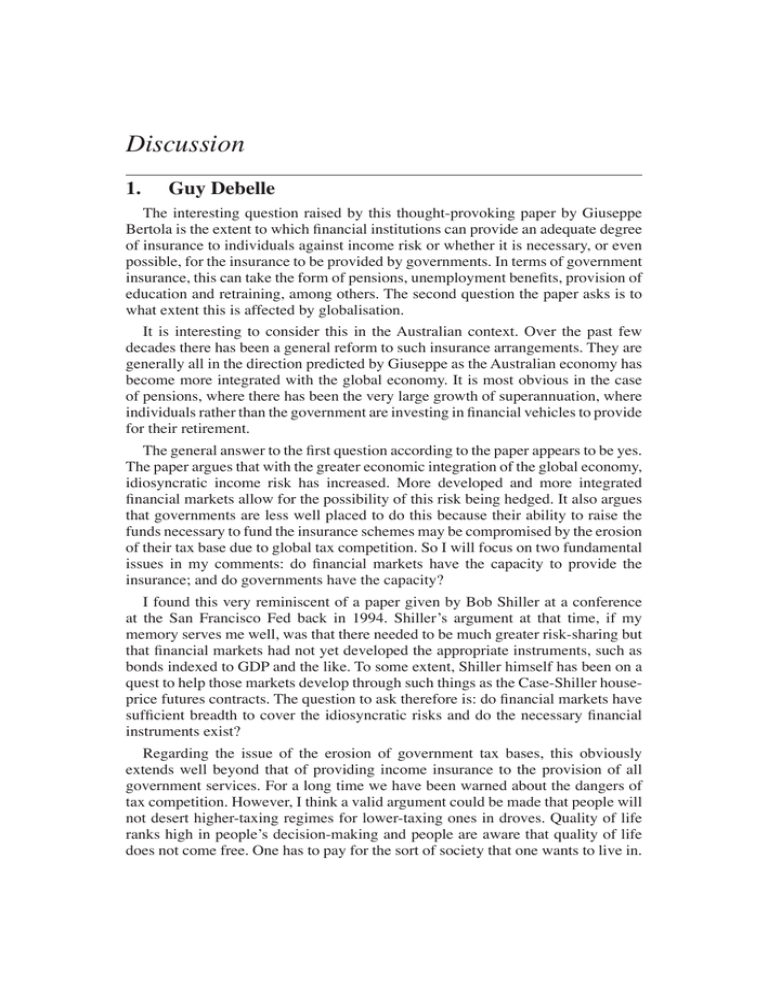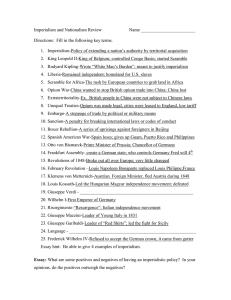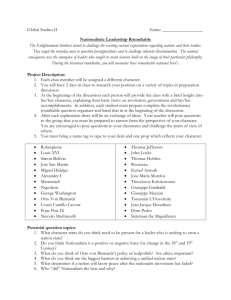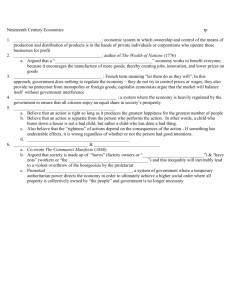Discussion 1. Guy Debelle
advertisement

196 Discussion Discussion 1. Guy Debelle The interesting question raised by this thought-provoking paper by Giuseppe Bertola is the extent to which financial institutions can provide an adequate degree of insurance to individuals against income risk or whether it is necessary, or even possible, for the insurance to be provided by governments. In terms of government insurance, this can take the form of pensions, unemployment benefits, provision of education and retraining, among others. The second question the paper asks is to what extent this is affected by globalisation. It is interesting to consider this in the Australian context. Over the past few decades there has been a general reform to such insurance arrangements. They are generally all in the direction predicted by Giuseppe as the Australian economy has become more integrated with the global economy. It is most obvious in the case of pensions, where there has been the very large growth of superannuation, where individuals rather than the government are investing in financial vehicles to provide for their retirement. The general answer to the first question according to the paper appears to be yes. The paper argues that with the greater economic integration of the global economy, idiosyncratic income risk has increased. More developed and more integrated financial markets allow for the possibility of this risk being hedged. It also argues that governments are less well placed to do this because their ability to raise the funds necessary to fund the insurance schemes may be compromised by the erosion of their tax base due to global tax competition. So I will focus on two fundamental issues in my comments: do financial markets have the capacity to provide the insurance; and do governments have the capacity? I found this very reminiscent of a paper given by Bob Shiller at a conference at the San Francisco Fed back in 1994. Shiller’s argument at that time, if my memory serves me well, was that there needed to be much greater risk-sharing but that financial markets had not yet developed the appropriate instruments, such as bonds indexed to GDP and the like. To some extent, Shiller himself has been on a quest to help those markets develop through such things as the Case-Shiller houseprice futures contracts. The question to ask therefore is: do financial markets have sufficient breadth to cover the idiosyncratic risks and do the necessary financial instruments exist? Regarding the issue of the erosion of government tax bases, this obviously extends well beyond that of providing income insurance to the provision of all government services. For a long time we have been warned about the dangers of tax competition. However, I think a valid argument could be made that people will not desert higher-taxing regimes for lower-taxing ones in droves. Quality of life ranks high in people’s decision-making and people are aware that quality of life does not come free. One has to pay for the sort of society that one wants to live in. Discussion 197 The experience of the Nordic countries would support this argument. Indeed, the Nordics’ willingness and ability to do this is evident in Giuseppe’s results. One aspect where governments may have an advantage over financial markets, at least at this point, is dealing with intergenerational issues. Financial markets are open to those that are alive (and financially active) at the moment. They are not open to future generations. Governments can (if they want) take better account of the needs of future generations. Governments are also better at coping with events that are outside the range of financial market comprehension. Hurricane Katrina is a good example of this. Catastrophy insurance was available but the losses associated with the hurricane were well outside the bounds of that assumed by the insurance and so the government was required to provide the funding to get the New Orleans area back to normal. The paper discusses financial development in the United Kingdom as a good example of the arguments presented here. I am not sure that I would agree with Giuseppe’s characterisation of it. Financial reforms in the UK were broadly coincident with labour market and other public sector reforms. It and the other reforms were, to a large extent, a function of the UK crisis of the late 1970s which necessitated the involvement of the International Monetary Fund. It is worth noting that the UK financial reforms led to their own crisis in the early 1990s. They contributed in a sizeable way to an asset-price boom and bust, which I would not regard as a good advertisement of the ability of the financial markets to provide insurance. Another interpretation of what happened is that the financial markets allowed UK residents’ optimism about the future to be reflected in their borrowing and house prices. This was a form of income smoothing but one based on what turned out to be excessive optimism about future income paths. As this unwound it turned out to be quite traumatic and required the government to step in and provide the insurance by running a budget deficit. So the ability of financial markets to insure against idiosyncratic risk was found to be wanting in this instance. Current developments in financial markets also cast doubt on the financial markets’ ability to provide the appropriate insurance. One can claim that if adequate supervisory frameworks had been in place this could have been avoided, but I think that is too glib an answer. Let me now turn to Giuseppe’s arguments about the effect of globalisation on all of this. As we all know from our trade economics, opening up a country leads to gains from trade which are of net benefit to the country. There are those who lose from the opening up to trade, but the winners should be able to compensate the losers. This is a within-country proposition, not an across-country one. However, it is also worth noting that this is a comparative static proposition, and not one about the exposure to shocks once the economy has been opened up. Does integration increase labour income risk? The paper states that survey evidence suggests that the answer is yes, but I would not rely on this to be an accurate reflection of the reality. This is fundamentally an empirical question testable by data not surveys. 198 Discussion The inter-country insurance that Giuseppe is talking about could perhaps better be construed as being about changes in the terms of trade. Or perhaps idiosyncratic GDP risk. In this instance it is not clear to me why this could be better provided at the micro level by financial markets, rather than at the macro level by governments. The government could still access the financial markets to provide the insurance on behalf of all its citizens, perhaps through a GDP bond. The government conceivably has stronger bargaining power with financial markets and probably can be more easily monitored by markets. The funds raised by the government in this form could potentially be used to fund their own internal insurance programs. Sovereign wealth funds and the Norwegian Petroleum Fund are good examples of where the government has acted through financial markets on behalf of their citizens to provide income insurance. Another potential missing element of the markets, which Giuseppe envisages, might be the absence of particular countries. Will it be possible, even within developed countries, to rely on cross-country insurance if not everyone is participating? Insurance does not work properly if the person against whose income my income negatively co-varies is not at the table. So if all the Anglo-Saxon countries go down this route and their business cycles have a high positive correlation but all the Continental Europeans go down the public insurance path, I do not see this market working very effectively. Let me make a few brief comments on the empirical evidence. I do not find the time-series results all that convincing. The correlation between credit and public spending may be picking up more of the normal procyclical aspect of credit growth. Indeed, the correlation between openness and government consumption may also be just picking up the global business cycle. The business cycle is probably driving too much of the variation in all of the variables that Giuseppe is looking at. Hence I think the cross-sectional regressions are likely to be the better place to be looking for the answers. So to finish, Giuseppe’s paper raises some very interesting questions; particularly the degree to which financial markets can provide the necessary insurance for individuals in a globalised economy. I remain unconvinced that financial markets can do the job completely, in part because of the incompleteness of financial markets. It is also not clear to me how much more integration of global economies necessitates an increased reliance on financial markets. 2. General Discussion Discussion centred on the reasons for the increase in household indebtedness across many countries in the OECD over recent decades, and what this means for the vulnerability of the household sector. One participant pointed out that there was a tension between the research of labour economists, which suggested that individuals’ uncertainty about their labour income had increased in recent years, and macroeconomic research suggesting that indebtedness had increased most in Discussion 199 countries that had experienced larger falls in unemployment. This sentiment was echoed by others, with calls for greater collaboration between labour economists and macroeconomists and more analysis of idiosyncratic risk within countries. There followed a robust debate about whether or not households had taken on more debt and risk in general than was optimal. Those worried about the vulnerability of the household sector pointed to potential over-valuation of house prices in many countries, the increased proportion of household balance sheets exposed to sudden changes in financial markets, and the procyclicality of credit. In response, one participant argued that: household debt had been trending up relative to incomes for over 30 years; much of this reflected an adjustment to the earlier period of financial repression where households had extremely limited access to credit; households may simply have chosen to spend an increasing proportion of their incomes on housing as their incomes have increased; and it is not clear that households have exhausted their capacity to borrow. Another thought that it was very difficult to tell when risk-taking had gone too far and pointed to Greenspan’s ‘irrational exuberance’ speech as a classic example of calling a bubble too early. A number of participants thought that with regard to sustainability there were two issues worth distinguishing: likely trends in indebtedness over the longer term and episodes of instability where debt and asset prices may have risen more rapidly than justified by an orderly long-run adjustment. Reasons for the run-up in house prices in many countries received an airing. One participant argued that house prices may have increased more in Australia than the United States because there were more restrictions on the supply of land, while another argued that the direction of causality between house prices and debt ran both ways. There was also some discussion of whether the structural decline in real interest rates seen in many countries had contributed to debt and house price growth, particularly in countries where the decline was accompanied by financial deregulation. Donald Kohn replied that it was still unclear what the structural reasons for the increase in house prices were, given that it occurred many years after financial deregulation in the US and the large falls in real interest rates. Even so, he thought that financial innovation had played a role of late and that supply constraints were important, citing differences in the experience of regions in the US bordered by the coasts and those where land is more readily available for development. He also argued that the relationship between changes in interest rates and consumption could go either way because for every household making larger interest payments there was another receiving more interest income. Participants also raised some interesting questions about the recent turmoil in the sub-prime mortgage market. For example, one asked whether the crisis would have evolved differently had the US been a less open economy, while another wondered what the implications for regulators were. In response, Donald Kohn argued that openness had probably contributed to the ability of the US economy to combine low savings rates with low interest rates. He then opined that central bankers had a good understanding of the problems once they had emerged, but were not well placed to prevent the problems from emerging in the first place, and went on to emphasise that most of the bad loans were made by unregulated entities and entities regulated 200 Discussion at the state level, and that states typically devote few resources to such issues. He also thought that the model of originating and selling mortgages had reduced the incentives to monitor the quality of these assets and that there may be too much reliance on credit ratings in pricing the risk of such assets. Nevertheless, he thought that the basic ‘model’ was not broken, though it was in need of reform. He cautioned against the temptation to respond to these problems through excessive regulation, arguing instead that there is a need to increase transparency and to broaden oversight of unregulated entities. Christopher Kent noted that much of their paper had dealt with issues related to the trend rise in indebtedness over the longer term, and their stylised facts needed to be interpreted in that light. For example, he argued that most would accept that the decline in inflation across the OECD over the past two decades or so was driven largely by better monetary policy, and so could be thought of as largely exogenous with respect to household indebtedness. On the question of cyclical developments, he noted that their paper acknowledged that the speed of adjustment of debt – and asset prices – was important and that especially rapid adjustment had led to periods of instability in a number of countries, particularly following financial deregulation. He agreed that a better understanding of developments affecting the volatility of income was needed, particularly with regard to the ability of households to obtain and service debts. Discussion of Giuseppe Bertola’s paper focused on whether the results from his time-series regressions simply reflected the procyclicality of credit. In response he argued that this was unlikely because his regressions control for the business cycle. He also pointed out that country-specific factors are likely to be important but are not included in his regressions.





